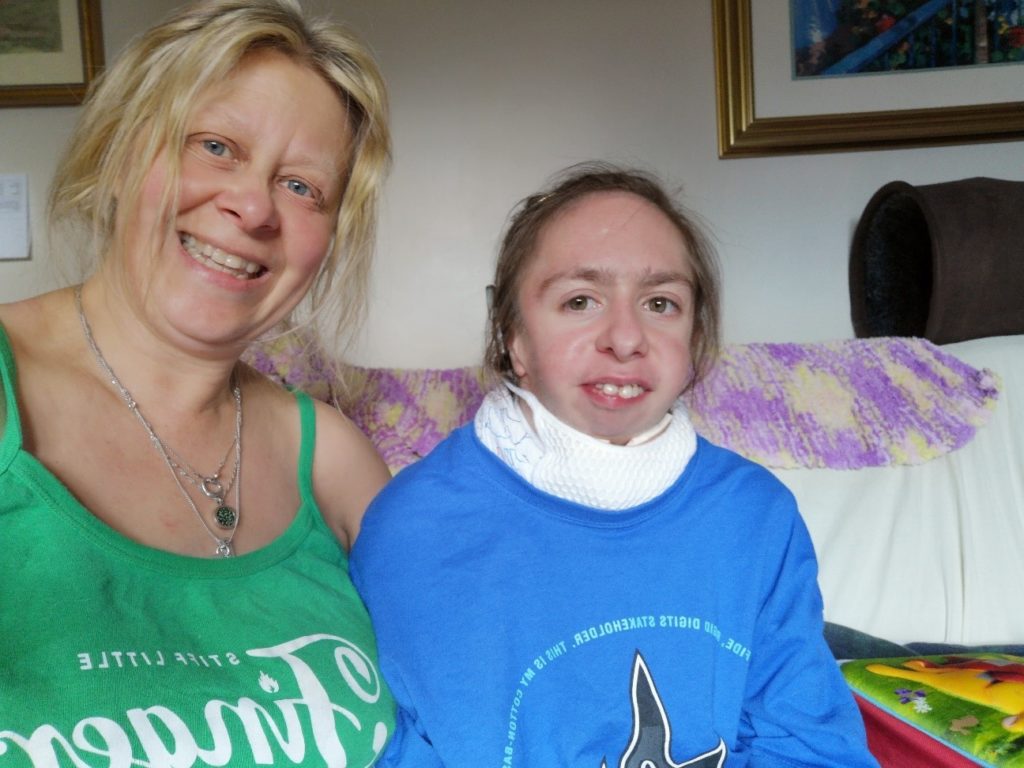The end of free Covid testing in England is a huge worry for families and those who are ‘extremely vulnerable’ from Covid
From today, people in England will have to pay for symptomatic and asymptomatic Covid-19 testing. People in high-risk groups, and those in danger of developing dangerous symptoms, will be exempt.
This marks another step in the Government scaling back Covid-19 safety measures in England.
Ministers say the vaccines will protect the general public, but with infection levels in the community rising, the move to drop free testing is a huge worry for families and those who are extremely vulnerable from Covid-19.
Nicola Slator, mother and full-time carer to Rebecca, thinks her daughter may now be at greater risk from a virus that could kill her.

You may recognise Nicola and Rebecca. They have been strong supporters of our campaign to ensure disabled people and their families are heard at the Covid-19 Inquiry
Nicola told us:
“If the general public isn’t testing, then we’re going to see higher infection levels in the community, and this puts Rebecca at greater risk.”
As campaign manager at Sense, I believe today’s change is unfair.
Many families and carers of disabled people depend on free Covid-19 tests to safely care for their loved ones.
Scrapping free tests is essentially putting a tax on caring.
I know that personally, I have found the free testing hugely important in providing extra reassurance before seeing friends and family. But for many disabled people and those who are clinically vulnerable, this goes a step further.
Having access to testing can be the difference between disabled people going out and seeing others, or staying at home. Many rely on free testing to enable them to mix with others and see loved ones.
Last month, Sense research revealed that 6 in ten disabled people are fearful of going outside because of the removal of Covid-19 restrictions and end of free testing. By removing this additional precaution, the Government is further excluding many disabled people who are already worried about mixing with others following the pandemic.
It sends a very public message that the pandemic is over, and that we no longer need to act cautiously to protect our neighbours, colleagues and those around us who might be more vulnerable. When in fact, the reality is very different.
It was only last week that ONS figures showed that Covid cases had climbed by a million in one week in the UK. Yet this steep rise in cases hasn’t deterred the Government from ploughing ahead with plans.
Through our campaigning at Sense, I’ve heard from disabled people and their families who’ve been shielding for months at a time over the past two years – and how challenging this has been. To now expect society to go back to ‘normal’ by continuing to remove safety measures, feels like the Government are almost denying the pandemic is still ongoing.
The cost of living crisis
Adding a cost to testing also presents an extra financial barrier for those who might be struggling following a global pandemic. We are in the midst of a cost of living crisis, with more than three quarters (78 per cent) of disabled people being worried that rising living costs will push them into debt. This next step does nothing to address the divisions we’re seeing across society.
While we all want to move forward, we must remember that many people, including those who are disabled, are still being disproportionately impacted by the pandemic. The removal of free testing is yet another example of the needs of disabled people being deprioritised, and the Government simply not recognising and providing sufficient support for the groups who are most impacted.
At Sense, we’ve been calling for disabled people’s voices to be heard in this year’s public inquiry into Covid-19. The inquiry is an opportunity to hear disabled people’s experiences, learn from what’s happened and start to address equalities that still exist in society.
Act now to make sure disabled people are heard
The draft Terms of Reference for the inquiry have now been published. This sets out the issues that will be investigated.
The public have been asked to give their views. We need your help to raise the issues that have most impacted disabled people. But you only have until 7 April.
Give your views in the consultation survey or check out the key issues we think are missing and will be calling for. You can use this to fill in the survey in your own words.

